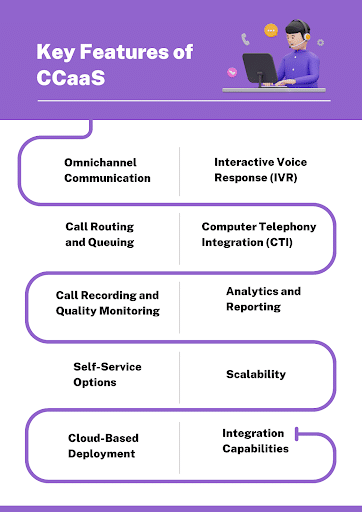Table of Contents
Have you ever wondered how the transportation industry will keep pace with the rapidly evolving demands of modern communication?
In an era where timely, accurate, and seamless communication is crucial, traditional systems are increasingly falling short. Enter Contact Center as a Service (CCaaS) – a transformative solution that is revolutionizing how transportation companies connect with customers, manage operations, and maintain a competitive edge.
This article explores why CCaaS is rapidly becoming the cornerstone of future transportation communication systems, offering unparalleled scalability, flexibility, and efficiency.
The Paradigm Shift in Transportation Communication
The Evolution of Communication Systems in Transportation
The transportation industry has long relied on traditional communication methods to keep its operations running smoothly. In the past, phone calls and radio dispatches were the primary means of coordination between drivers, dispatchers, and customers. These systems, while functional for their time, were often limited in reach and efficiency.
As the industry became more complex and customer expectations evolved, the need for more sophisticated communication systems became clear. The advent of mobile technology and the internet opened up new possibilities, but many transportation companies struggled to keep pace with these rapid changes.
Limitations of Legacy Systems
Traditional communication systems in transportation face several challenges that hinder their effectiveness in today’s fast-paced environment:
- Scalability issues: As companies grow, legacy systems often struggle to expand, leading to communication bottlenecks and reduced efficiency.
- High maintenance costs: Outdated hardware and software require frequent repairs and updates, driving up operational expenses.
- Limited integration: Many traditional systems operate in silos, making it difficult to share information across different departments or with external partners.
- Inflexibility: Legacy systems often lack the agility to adapt to changing communication needs, such as incorporating new channels or supporting remote work.
These limitations can have serious consequences for transportation companies, including operational inefficiencies, customer dissatisfaction, and difficulty in adapting to market changes. As the industry continues to evolve, it’s clear that a more robust and flexible communication solution is needed.
CCaaS: A Game Changer for Transportation
Contact Center as a Service (CCaaS) offers a revolutionary approach to transportation communication, addressing the limitations of traditional systems while introducing advanced capabilities that can significantly enhance operations.
Seamless Integration Across Channels
CCaaS unifies multiple communication channels, allowing transportation companies to manage voice, text, email, and social media from a single platform. This integration ensures consistent customer experiences, streamlined internal communication, and improved information sharing.
By breaking down communication silos, CCaaS enables companies to deliver more responsive and efficient services, improving both customer satisfaction and operational efficiency.
Scalability and Flexibility
CCaaS provides unmatched scalability and flexibility, crucial for transportation companies facing fluctuating demand. Unlike traditional systems that require costly hardware investments, CCaaS offers cloud-based solutions that can easily scale to meet business needs. This scalability extends to CCaaS pricing models as well, offering several advantages:
- Pay-as-you-go options: Companies can adjust their service level and costs based on current needs.
- Flexible pricing structures: Optimize communication expenses by paying only for services used.
- Easy scaling: Quickly ramp up capacity during peak periods without long-term commitments.
- Cost-effective growth: Add new features or users without significant upfront investments.
This adaptability in both functionality and cost allows transportation businesses to:
- Manage expenses effectively
- Support a growing workforce
- Rapidly incorporate new features or channels
- Maintain a competitive edge in a dynamic market
As transportation needs evolve, CCaaS solutions can be easily adjusted without extensive infrastructure changes. This ensures that companies can stay agile in a rapidly changing industry landscape, always having access to the latest communication technologies without the burden of constant system overhauls.
Enhancing Data-Driven Decision-Making
With powerful analytics capabilities, CCaaS empowers transportation companies to make informed, data-driven decisions. Key benefits include:
- Real-time monitoring: Allows immediate adjustments to staffing and resource allocation based on live communication data.
- Advanced reporting tools: Provide insights into customer preferences and behavior, helping to tailor services and improve satisfaction.
- Predictive analytics: Anticipates peak periods and potential issues, enabling proactive management.
- Integration with business systems: Provides a holistic view of operations, enabling more comprehensive decision-making.
By utilizing these data capabilities, transportation companies can optimize routes, enhance fleet management, and improve overall service delivery, leading to greater efficiency and customer satisfaction.

Future-Proofing Transportation Communication with CCaaS
The Role of AI and Automation
As artificial intelligence and automation technologies continue to evolve, CCaaS platforms are increasingly utilizing these tools to enhance communication efficiency in the transportation industry. Key applications include:
- Chatbots: Handle routine inquiries like shipment tracking and estimated arrival times.
- Predictive analytics: Anticipate communication needs based on historical data and trends.
- Automated routing and scheduling: Optimize fleet utilization and reduce delays using real-time data.
- Natural language processing: Improve voice recognition and sentiment analysis for better customer interactions.
These AI-driven features enable transportation companies to manage higher interaction volumes without sacrificing quality.
Enhancing Security and Compliance
CCaaS platforms offer robust security features crucial for protecting sensitive transportation data. Key security measures include:
- End-to-end encryption: Ensures all communications are secure from interception.
- Multi-factor authentication: Prevents unauthorized access to systems.
- Compliance audits: Regular checks to ensure adherence to industry standards.
- Advanced access controls: Manage user permissions and protect sensitive information.
These features help transportation companies maintain security and regulatory compliance, reducing the risk of data breaches.
Supporting a Remote and Distributed Workforce
CCaaS supports remote work by offering cloud-based access, collaborative tools, and real-time management capabilities, allowing transportation companies to efficiently manage a dispersed team and adapt to changing work environments.
This flexibility not only ensures continuity during disruptions but also enables companies to attract and retain top talent from anywhere in the world. Additionally, it facilitates consistent communication and collaboration, ensuring that all team members are aligned with organizational goals regardless of their location.
The Road Ahead: Strategic Considerations for Adoption
Selecting the Right CCaaS Provider
Choosing the right CCaaS provider is critical for transportation companies aiming for successful implementation. Key considerations include the provider’s integration capabilities with existing fleet and CRM systems, the quality of customer support and training programs, scalability to accommodate future growth, and cost-effectiveness, including transparency around pricing and potential hidden fees.
Additionally, choosing a provider with industry-specific features and expertise in transportation can ensure tailored solutions that meet unique operational needs.
Overcoming Implementation Challenges
Transitioning to CCaaS from traditional systems can be challenging. To ensure a smooth implementation, companies should develop a comprehensive plan, provide thorough training, and begin with a pilot program to identify issues early.
Gathering user feedback and applying strong change management practices will help mitigate resistance and optimize the adoption process.
Long-Term Benefits and ROI
Investing in CCaaS offers long-term benefits such as reduced operational costs, enhanced customer satisfaction, greater agility, and improved employee productivity, all contributing to a stronger competitive edge.
Additionally, the ability to leverage real-time data for informed decision-making can drive more strategic growth. Over time, these advantages can lead to sustained profitability and a more resilient business model in the ever-evolving transportation industry.
Frequently Asked Questions
How does CCaaS benefit transportation companies?
CCaaS enhances communication efficiency, provides real-time data insights, and supports scalability, helping transportation companies improve customer satisfaction and streamline operations.
What are the key security features of CCaaS?
CCaaS platforms offer end-to-end encryption, multi-factor authentication, and regular compliance audits, ensuring the protection of sensitive transportation data.
Can CCaaS support remote work in transportation?
Yes, CCaaS provides cloud-based access, collaborative tools, and real-time management capabilities, making it ideal for managing remote and distributed teams effectively.
Embracing the Future of Transportation Communication
CCaaS is revolutionizing transportation communication by offering advanced, scalable, and secure solutions. Its ability to integrate multiple communication channels, support remote work, and enhance data-driven decision-making makes it indispensable for the future of the industry. Adopting CCaaS now will position transportation companies to thrive in an increasingly connected and competitive world.
Read More on KulFiy
What Is Telecom Expense Management and Why Is It Important
The Benefits of Using a Data Visualization Tool for Your Database System
Preparing Employees For New Administration Systems
The Benefits of Using a Data Visualization Tool for Your Database System
